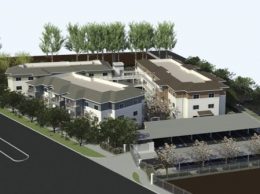Commission recommends Puente Power Project be built on alternative site
The California Coastal Commission has unanimously recommended that Oxnard’s Puente Power Project be built somewhere other than the site of an existing power plant on Mandalay Beach.
The Coastal Commission made the recommendation at a Sept. 9 meeting in Newport Beach, saying the Puente Power Project should be built on an alternative site outside of 100-year-flood zones where a power plant would not be at risk due to flooding caused by storm waves, coastal erosion or sea level rise caused by climate change.
By law, the Coastal Commission must weigh in on power plants built along the coast. The Coastal Commission made the recommendation to the California Energy Commission, which will ultimately decide where the plant is located.
Houston-based NRG Energy wants to build a 262-megawatt peaker plant on Mandalay Beach to replace two aging steam generators already at the site. NRG’s plans call for a natural gas fired power plant that would essentially work like a natural-gas fired jet engine, could be fired up in only a few minutes and be used for only a few hours each day when the electric grid needs additional energy.
New environmental regulations require that seawater-cooled plants stop operations by the end of 2020.
In May, the California Public Utilities Commission greenlit the project, saying it will work like it is designed to. Now the energy commission must decide the site of the power plant.
The Coastal Commission voted after an Aug. 22 staff report recommended the action. The staff report also recommended a new plant be built above or protected from a 500-year flood plain that includes 2 feet of height for further seal level rise.
If the Energy Commission approves the power plant for the Mandalay Beach site, the Coastal Commission recommended NRG implement a sand dune monitoring program to monitor the strength and health of the approximately 20-foot-tall sand dunes that protect the plant.
“In the second half of the century (the plant) is likely to be subject to hazards, including increasingly frequent and severe flooding and shoreline erosion, which will render the facility inoperable,” the report said.
“The science is clear. You have to be real about it, and this is just not the right place to site something like this,” Commissioner Erick Howell said at the meeting.
If the facility is built, the report recommended NRG have a plan to decommission and remove the plant because of sea level rise.
The report recommends the plant be built at one of several alternative sites, including one near an existing plant on Ormond Beach that is also scheduled to be decommissioned.
In June, the Energy Commission issued a preliminary report which said environmental concerns can be mitigated and that the project is not expected to cause significant effects to public health and safety.
The Energy Commission will hold another public meeting about the plant’s current status at the Oxnard Performing Arts Center at 3 p.m. Sept. 27.
• Contact Philip Joens at [email protected].










